FNCE4036EL-12 Risk Management Assignment: Problems and Solutions
VerifiedAdded on 2022/08/23
|9
|1247
|15
Homework Assignment
AI Summary
This document contains the solutions to a Finance assignment (FNCE4036) from Laurentian University, focusing on risk management. The assignment is divided into two parts: Part A consists of multiple-choice questions covering topics related to risk management, while Part B involves problem-solving and short answer questions. The solutions address concepts such as prepayment risk, operational risk, portfolio diversification, Dutch auctions, operational risk capital, beta calculation, probability and expected payouts, and hedge fund and mutual fund returns, as well as present value calculations. The solutions are comprehensive, including detailed calculations and explanations to help students understand the concepts and solve the problems effectively.

Finance
FNCE4036El12
FNCE4036El12
Paraphrase This Document
Need a fresh take? Get an instant paraphrase of this document with our AI Paraphraser
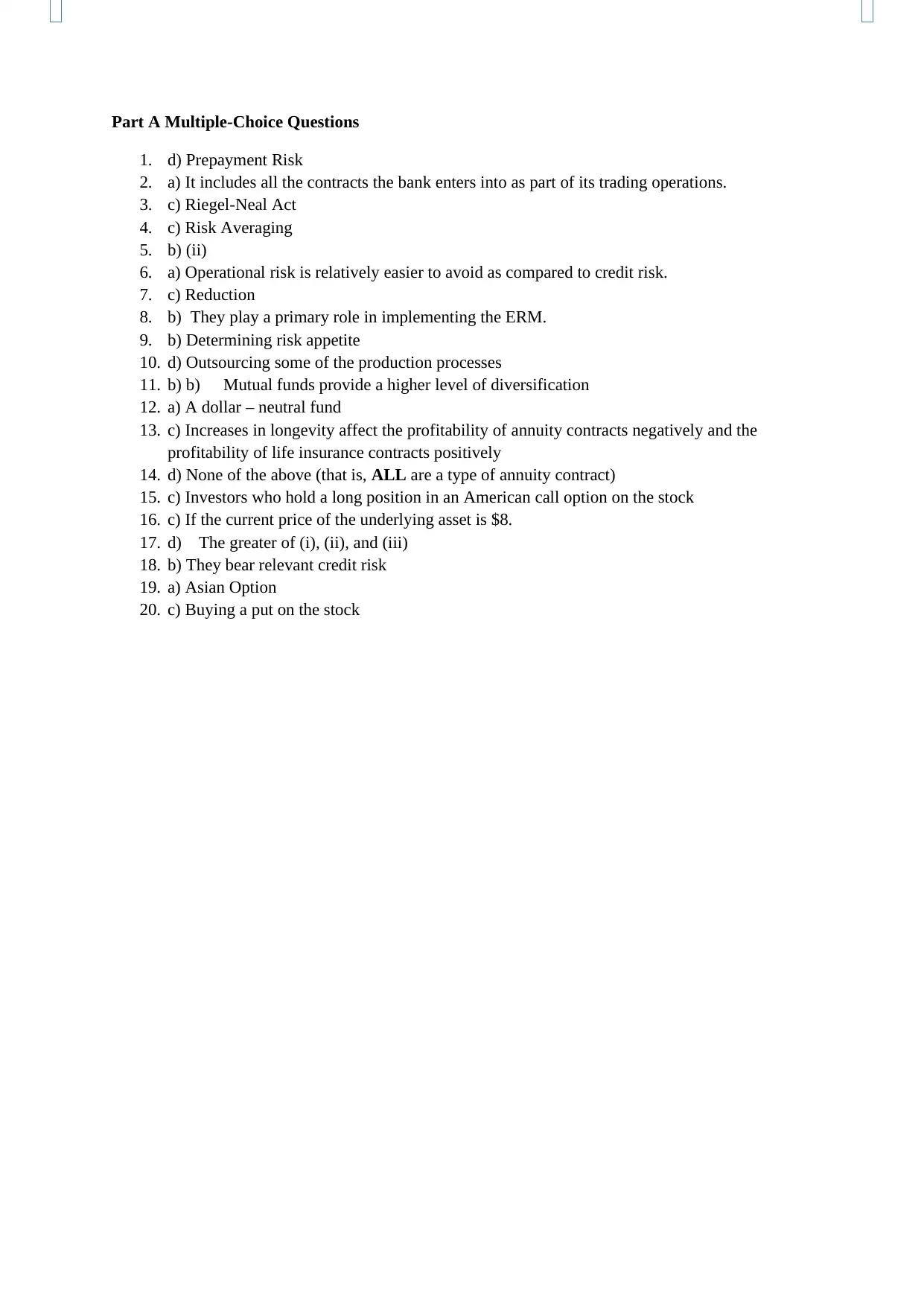
Part A Multiple-Choice Questions
1. d) Prepayment Risk
2. a) It includes all the contracts the bank enters into as part of its trading operations.
3. c) Riegel-Neal Act
4. c) Risk Averaging
5. b) (ii)
6. a) Operational risk is relatively easier to avoid as compared to credit risk.
7. c) Reduction
8. b) They play a primary role in implementing the ERM.
9. b) Determining risk appetite
10. d) Outsourcing some of the production processes
11. b) b) Mutual funds provide a higher level of diversification
12. a) A dollar – neutral fund
13. c) Increases in longevity affect the profitability of annuity contracts negatively and the
profitability of life insurance contracts positively
14. d) None of the above (that is, ALL are a type of annuity contract)
15. c) Investors who hold a long position in an American call option on the stock
16. c) If the current price of the underlying asset is $8.
17. d) The greater of (i), (ii), and (iii)
18. b) They bear relevant credit risk
19. a) Asian Option
20. c) Buying a put on the stock
1. d) Prepayment Risk
2. a) It includes all the contracts the bank enters into as part of its trading operations.
3. c) Riegel-Neal Act
4. c) Risk Averaging
5. b) (ii)
6. a) Operational risk is relatively easier to avoid as compared to credit risk.
7. c) Reduction
8. b) They play a primary role in implementing the ERM.
9. b) Determining risk appetite
10. d) Outsourcing some of the production processes
11. b) b) Mutual funds provide a higher level of diversification
12. a) A dollar – neutral fund
13. c) Increases in longevity affect the profitability of annuity contracts negatively and the
profitability of life insurance contracts positively
14. d) None of the above (that is, ALL are a type of annuity contract)
15. c) Investors who hold a long position in an American call option on the stock
16. c) If the current price of the underlying asset is $8.
17. d) The greater of (i), (ii), and (iii)
18. b) They bear relevant credit risk
19. a) Asian Option
20. c) Buying a put on the stock
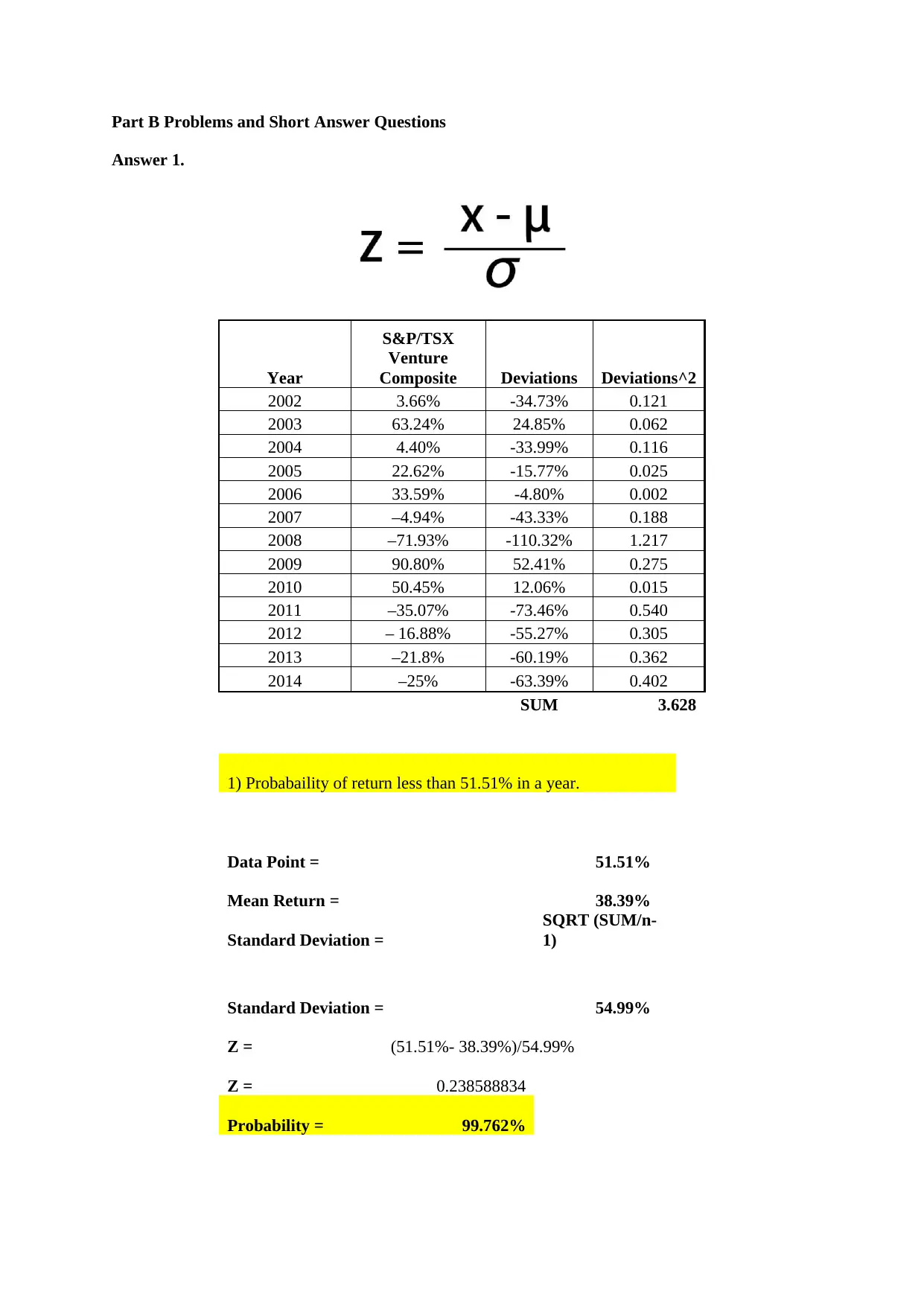
Part B Problems and Short Answer Questions
Answer 1.
Year
S&P/TSX
Venture
Composite Deviations Deviations^2
2002 3.66% -34.73% 0.121
2003 63.24% 24.85% 0.062
2004 4.40% -33.99% 0.116
2005 22.62% -15.77% 0.025
2006 33.59% -4.80% 0.002
2007 –4.94% -43.33% 0.188
2008 –71.93% -110.32% 1.217
2009 90.80% 52.41% 0.275
2010 50.45% 12.06% 0.015
2011 –35.07% -73.46% 0.540
2012 – 16.88% -55.27% 0.305
2013 –21.8% -60.19% 0.362
2014 –25% -63.39% 0.402
SUM 3.628
1) Probabaility of return less than 51.51% in a year.
Data Point = 51.51%
Mean Return = 38.39%
Standard Deviation =
SQRT (SUM/n-
1)
Standard Deviation = 54.99%
Z = (51.51%- 38.39%)/54.99%
Z = 0.238588834
Probability = 99.762%
Answer 1.
Year
S&P/TSX
Venture
Composite Deviations Deviations^2
2002 3.66% -34.73% 0.121
2003 63.24% 24.85% 0.062
2004 4.40% -33.99% 0.116
2005 22.62% -15.77% 0.025
2006 33.59% -4.80% 0.002
2007 –4.94% -43.33% 0.188
2008 –71.93% -110.32% 1.217
2009 90.80% 52.41% 0.275
2010 50.45% 12.06% 0.015
2011 –35.07% -73.46% 0.540
2012 – 16.88% -55.27% 0.305
2013 –21.8% -60.19% 0.362
2014 –25% -63.39% 0.402
SUM 3.628
1) Probabaility of return less than 51.51% in a year.
Data Point = 51.51%
Mean Return = 38.39%
Standard Deviation =
SQRT (SUM/n-
1)
Standard Deviation = 54.99%
Z = (51.51%- 38.39%)/54.99%
Z = 0.238588834
Probability = 99.762%
⊘ This is a preview!⊘
Do you want full access?
Subscribe today to unlock all pages.

Trusted by 1+ million students worldwide

Paraphrase This Document
Need a fresh take? Get an instant paraphrase of this document with our AI Paraphraser
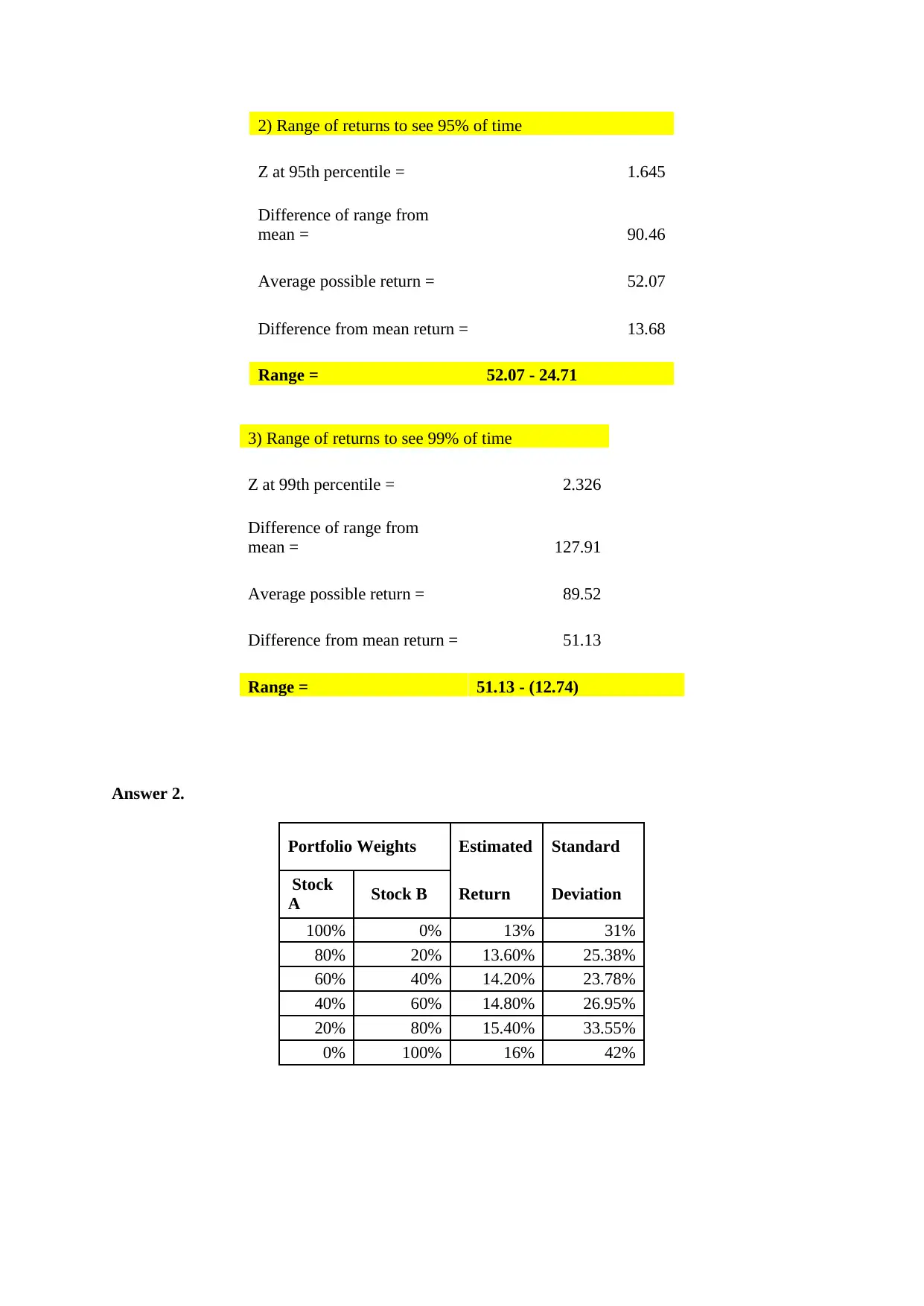
2) Range of returns to see 95% of time
Z at 95th percentile = 1.645
Difference of range from
mean = 90.46
Average possible return = 52.07
Difference from mean return = 13.68
Range = 52.07 - 24.71
3) Range of returns to see 99% of time
Z at 99th percentile = 2.326
Difference of range from
mean = 127.91
Average possible return = 89.52
Difference from mean return = 51.13
Range = 51.13 - (12.74)
Answer 2.
Portfolio Weights Estimated Standard
Stock
A Stock B Return Deviation
100% 0% 13% 31%
80% 20% 13.60% 25.38%
60% 40% 14.20% 23.78%
40% 60% 14.80% 26.95%
20% 80% 15.40% 33.55%
0% 100% 16% 42%
Z at 95th percentile = 1.645
Difference of range from
mean = 90.46
Average possible return = 52.07
Difference from mean return = 13.68
Range = 52.07 - 24.71
3) Range of returns to see 99% of time
Z at 99th percentile = 2.326
Difference of range from
mean = 127.91
Average possible return = 89.52
Difference from mean return = 51.13
Range = 51.13 - (12.74)
Answer 2.
Portfolio Weights Estimated Standard
Stock
A Stock B Return Deviation
100% 0% 13% 31%
80% 20% 13.60% 25.38%
60% 40% 14.20% 23.78%
40% 60% 14.80% 26.95%
20% 80% 15.40% 33.55%
0% 100% 16% 42%
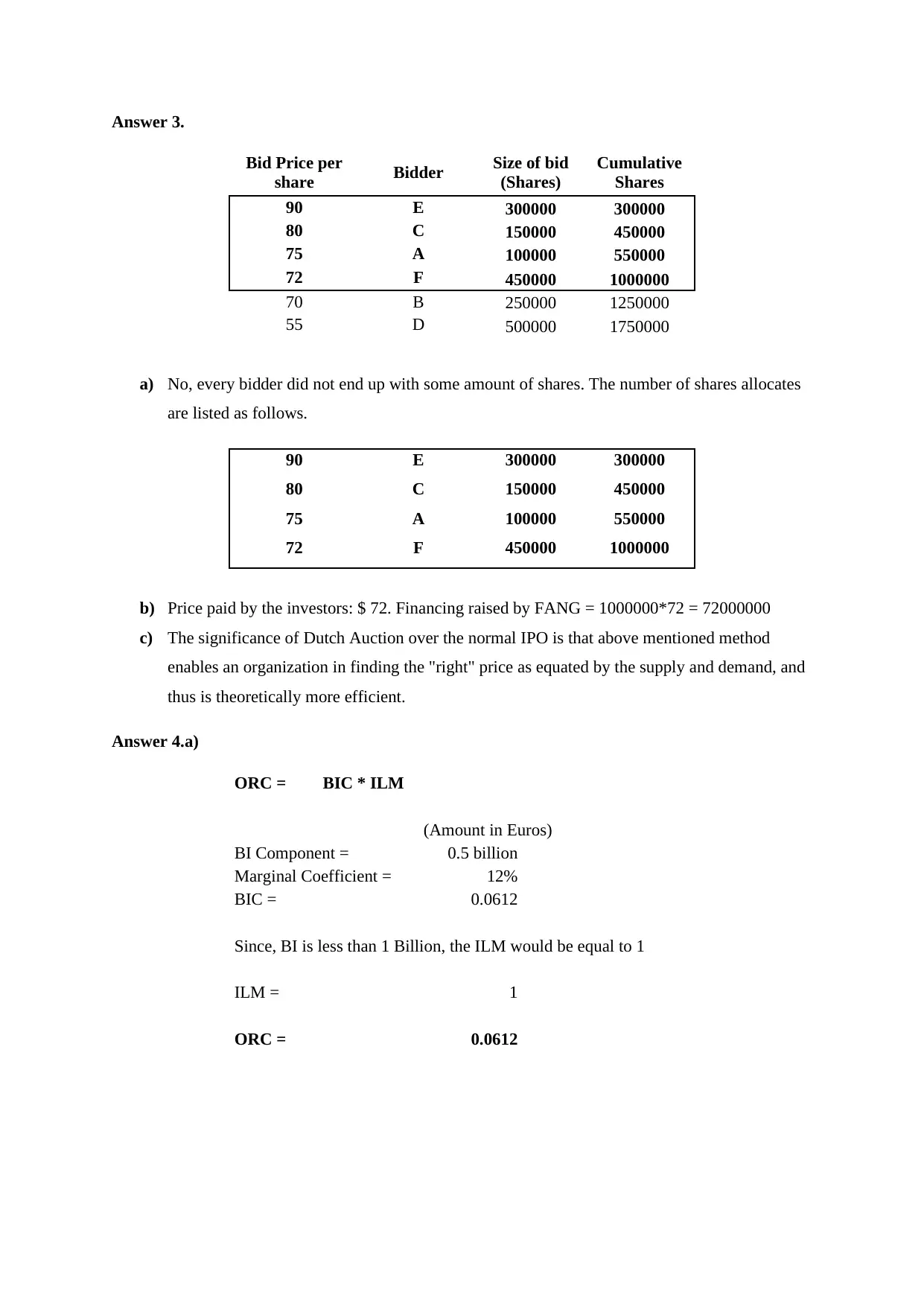
Answer 3.
Bid Price per
share Bidder Size of bid
(Shares)
Cumulative
Shares
90 E 300000 300000
80 C 150000 450000
75 A 100000 550000
72 F 450000 1000000
70 B 250000 1250000
55 D 500000 1750000
a) No, every bidder did not end up with some amount of shares. The number of shares allocates
are listed as follows.
90 E 300000 300000
80 C 150000 450000
75 A 100000 550000
72 F 450000 1000000
b) Price paid by the investors: $ 72. Financing raised by FANG = 1000000*72 = 72000000
c) The significance of Dutch Auction over the normal IPO is that above mentioned method
enables an organization in finding the "right" price as equated by the supply and demand, and
thus is theoretically more efficient.
Answer 4.a)
ORC = BIC * ILM
(Amount in Euros)
BI Component = 0.5 billion
Marginal Coefficient = 12%
BIC = 0.0612
Since, BI is less than 1 Billion, the ILM would be equal to 1
ILM = 1
ORC = 0.0612
Bid Price per
share Bidder Size of bid
(Shares)
Cumulative
Shares
90 E 300000 300000
80 C 150000 450000
75 A 100000 550000
72 F 450000 1000000
70 B 250000 1250000
55 D 500000 1750000
a) No, every bidder did not end up with some amount of shares. The number of shares allocates
are listed as follows.
90 E 300000 300000
80 C 150000 450000
75 A 100000 550000
72 F 450000 1000000
b) Price paid by the investors: $ 72. Financing raised by FANG = 1000000*72 = 72000000
c) The significance of Dutch Auction over the normal IPO is that above mentioned method
enables an organization in finding the "right" price as equated by the supply and demand, and
thus is theoretically more efficient.
Answer 4.a)
ORC = BIC * ILM
(Amount in Euros)
BI Component = 0.5 billion
Marginal Coefficient = 12%
BIC = 0.0612
Since, BI is less than 1 Billion, the ILM would be equal to 1
ILM = 1
ORC = 0.0612
⊘ This is a preview!⊘
Do you want full access?
Subscribe today to unlock all pages.

Trusted by 1+ million students worldwide
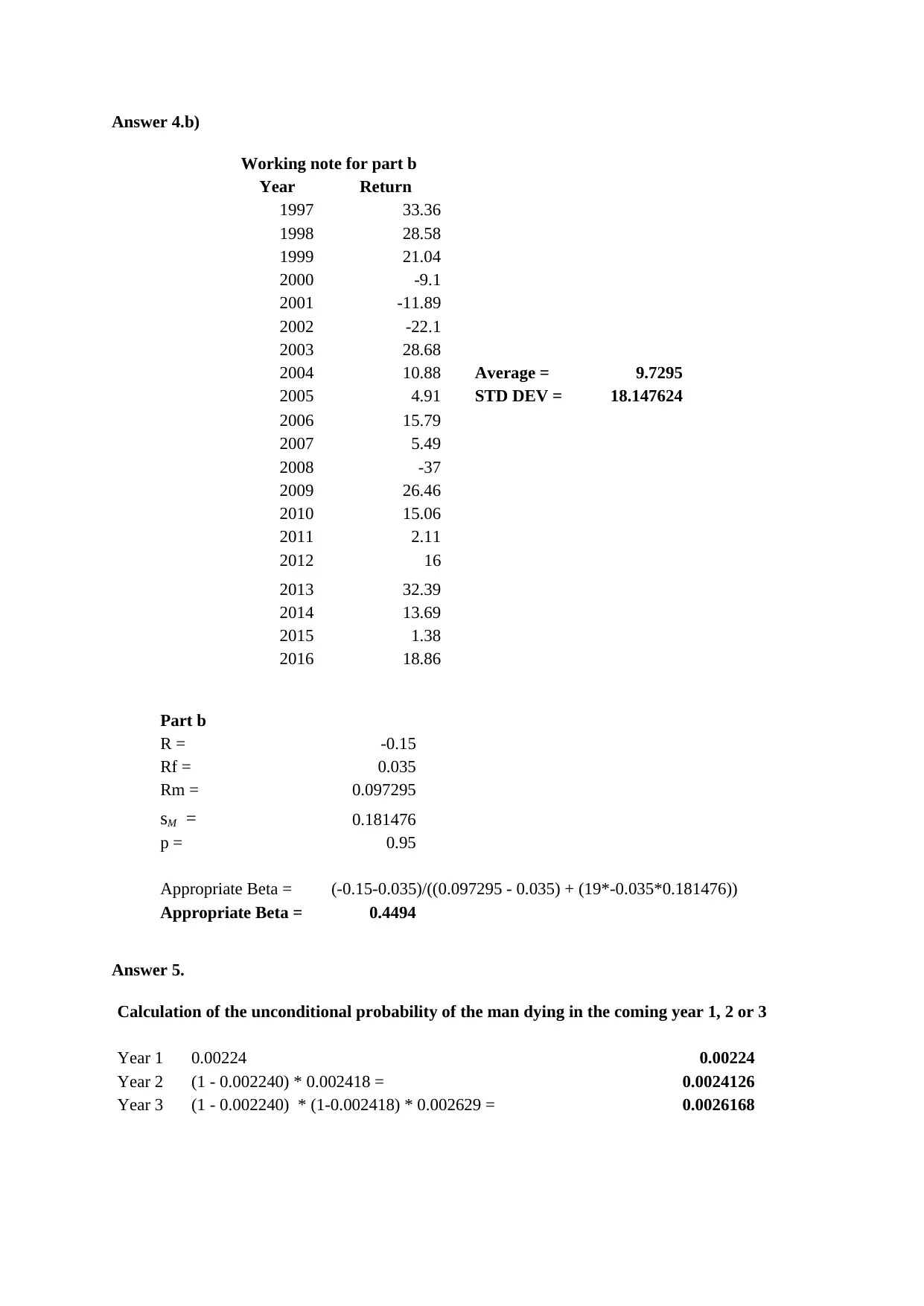
Answer 4.b)
Working note for part b
Year Return
1997 33.36
1998 28.58
1999 21.04
2000 -9.1
2001 -11.89
2002 -22.1
2003 28.68
2004 10.88 Average = 9.7295
2005 4.91 STD DEV = 18.147624
2006 15.79
2007 5.49
2008 -37
2009 26.46
2010 15.06
2011 2.11
2012 16
2013 32.39
2014 13.69
2015 1.38
2016 18.86
Part b
R = -0.15
Rf = 0.035
Rm = 0.097295
sM = 0.181476
p = 0.95
Appropriate Beta = (-0.15-0.035)/((0.097295 - 0.035) + (19*-0.035*0.181476))
Appropriate Beta = 0.4494
Answer 5.
Calculation of the unconditional probability of the man dying in the coming year 1, 2 or 3
Year 1 0.00224 0.00224
Year 2 (1 - 0.002240) * 0.002418 = 0.0024126
Year 3 (1 - 0.002240) * (1-0.002418) * 0.002629 = 0.0026168
Working note for part b
Year Return
1997 33.36
1998 28.58
1999 21.04
2000 -9.1
2001 -11.89
2002 -22.1
2003 28.68
2004 10.88 Average = 9.7295
2005 4.91 STD DEV = 18.147624
2006 15.79
2007 5.49
2008 -37
2009 26.46
2010 15.06
2011 2.11
2012 16
2013 32.39
2014 13.69
2015 1.38
2016 18.86
Part b
R = -0.15
Rf = 0.035
Rm = 0.097295
sM = 0.181476
p = 0.95
Appropriate Beta = (-0.15-0.035)/((0.097295 - 0.035) + (19*-0.035*0.181476))
Appropriate Beta = 0.4494
Answer 5.
Calculation of the unconditional probability of the man dying in the coming year 1, 2 or 3
Year 1 0.00224 0.00224
Year 2 (1 - 0.002240) * 0.002418 = 0.0024126
Year 3 (1 - 0.002240) * (1-0.002418) * 0.002629 = 0.0026168
Paraphrase This Document
Need a fresh take? Get an instant paraphrase of this document with our AI Paraphraser
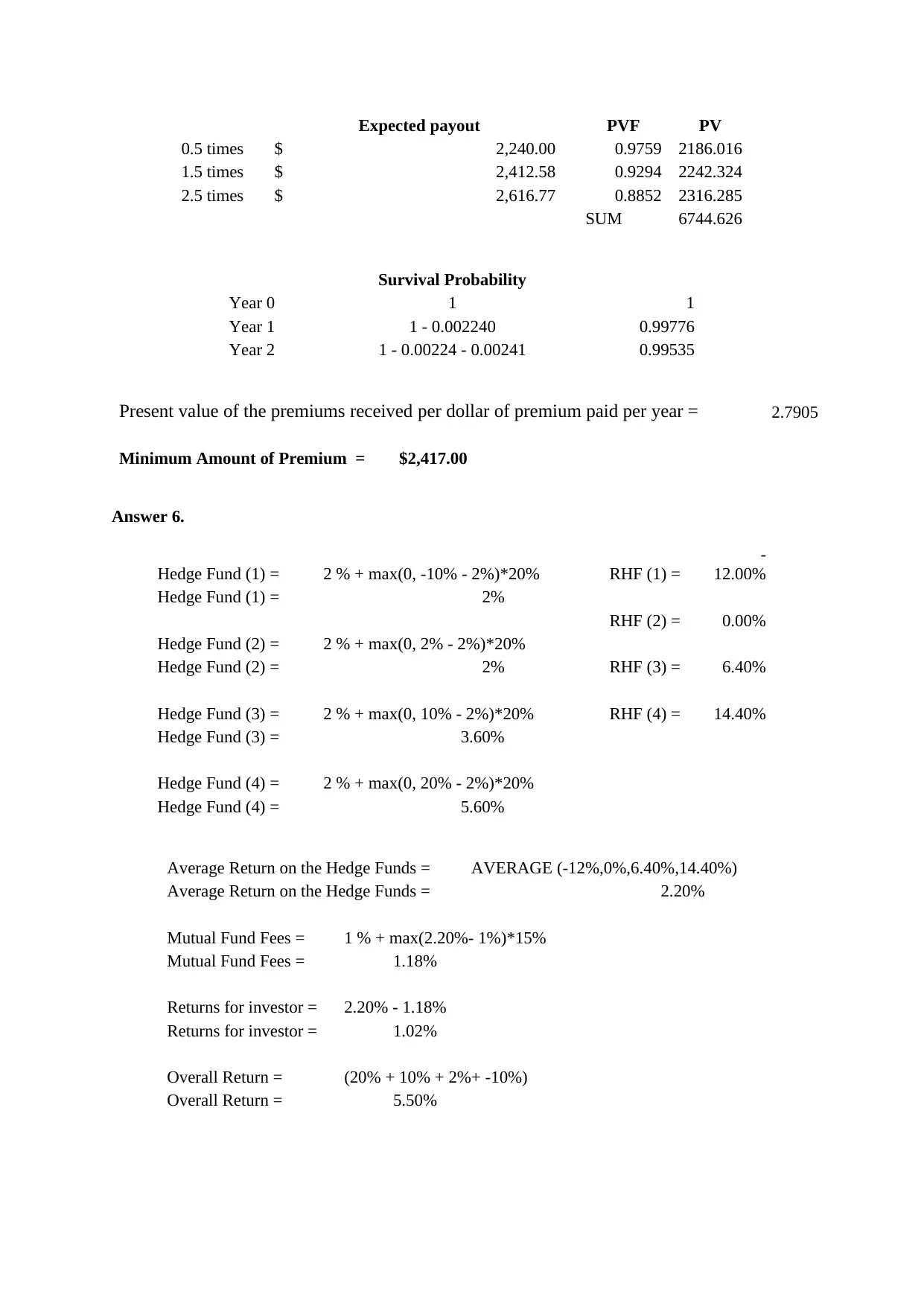
Expected payout PVF PV
0.5 times $ 2,240.00 0.9759 2186.016
1.5 times $ 2,412.58 0.9294 2242.324
2.5 times $ 2,616.77 0.8852 2316.285
SUM 6744.626
Survival Probability
Year 0 1 1
Year 1 1 - 0.002240 0.99776
Year 2 1 - 0.00224 - 0.00241 0.99535
Present value of the premiums received per dollar of premium paid per year = 2.7905
Minimum Amount of Premium = $2,417.00
Answer 6.
Hedge Fund (1) = 2 % + max(0, -10% - 2%)*20% RHF (1) =
-
12.00%
Hedge Fund (1) = 2%
RHF (2) = 0.00%
Hedge Fund (2) = 2 % + max(0, 2% - 2%)*20%
Hedge Fund (2) = 2% RHF (3) = 6.40%
Hedge Fund (3) = 2 % + max(0, 10% - 2%)*20% RHF (4) = 14.40%
Hedge Fund (3) = 3.60%
Hedge Fund (4) = 2 % + max(0, 20% - 2%)*20%
Hedge Fund (4) = 5.60%
Average Return on the Hedge Funds = AVERAGE (-12%,0%,6.40%,14.40%)
Average Return on the Hedge Funds = 2.20%
Mutual Fund Fees = 1 % + max(2.20%- 1%)*15%
Mutual Fund Fees = 1.18%
Returns for investor = 2.20% - 1.18%
Returns for investor = 1.02%
Overall Return = (20% + 10% + 2%+ -10%)
Overall Return = 5.50%
0.5 times $ 2,240.00 0.9759 2186.016
1.5 times $ 2,412.58 0.9294 2242.324
2.5 times $ 2,616.77 0.8852 2316.285
SUM 6744.626
Survival Probability
Year 0 1 1
Year 1 1 - 0.002240 0.99776
Year 2 1 - 0.00224 - 0.00241 0.99535
Present value of the premiums received per dollar of premium paid per year = 2.7905
Minimum Amount of Premium = $2,417.00
Answer 6.
Hedge Fund (1) = 2 % + max(0, -10% - 2%)*20% RHF (1) =
-
12.00%
Hedge Fund (1) = 2%
RHF (2) = 0.00%
Hedge Fund (2) = 2 % + max(0, 2% - 2%)*20%
Hedge Fund (2) = 2% RHF (3) = 6.40%
Hedge Fund (3) = 2 % + max(0, 10% - 2%)*20% RHF (4) = 14.40%
Hedge Fund (3) = 3.60%
Hedge Fund (4) = 2 % + max(0, 20% - 2%)*20%
Hedge Fund (4) = 5.60%
Average Return on the Hedge Funds = AVERAGE (-12%,0%,6.40%,14.40%)
Average Return on the Hedge Funds = 2.20%
Mutual Fund Fees = 1 % + max(2.20%- 1%)*15%
Mutual Fund Fees = 1.18%
Returns for investor = 2.20% - 1.18%
Returns for investor = 1.02%
Overall Return = (20% + 10% + 2%+ -10%)
Overall Return = 5.50%
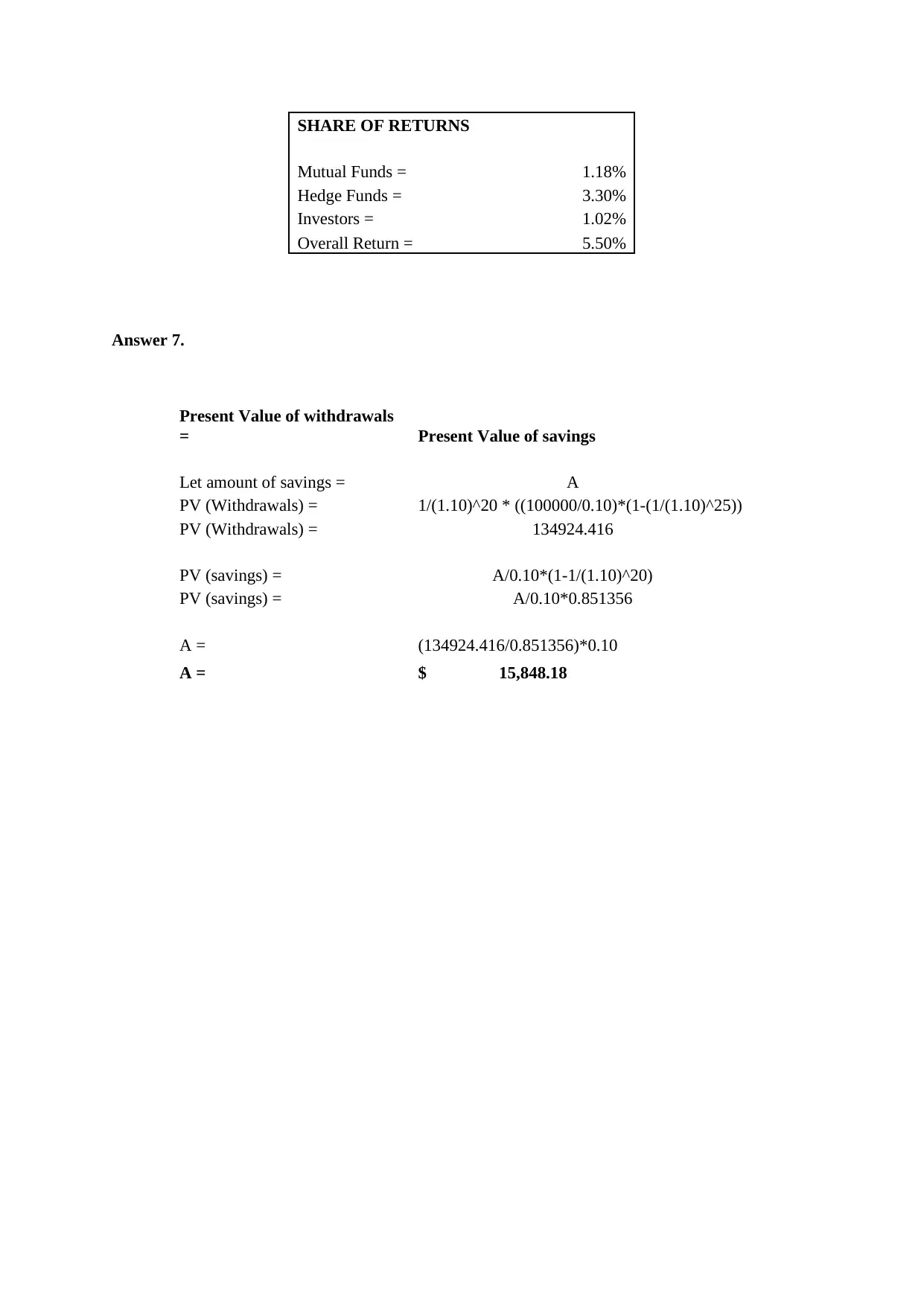
SHARE OF RETURNS
Mutual Funds = 1.18%
Hedge Funds = 3.30%
Investors = 1.02%
Overall Return = 5.50%
Answer 7.
Present Value of withdrawals
= Present Value of savings
Let amount of savings = A
PV (Withdrawals) = 1/(1.10)^20 * ((100000/0.10)*(1-(1/(1.10)^25))
PV (Withdrawals) = 134924.416
PV (savings) = A/0.10*(1-1/(1.10)^20)
PV (savings) = A/0.10*0.851356
A = (134924.416/0.851356)*0.10
A = $ 15,848.18
Mutual Funds = 1.18%
Hedge Funds = 3.30%
Investors = 1.02%
Overall Return = 5.50%
Answer 7.
Present Value of withdrawals
= Present Value of savings
Let amount of savings = A
PV (Withdrawals) = 1/(1.10)^20 * ((100000/0.10)*(1-(1/(1.10)^25))
PV (Withdrawals) = 134924.416
PV (savings) = A/0.10*(1-1/(1.10)^20)
PV (savings) = A/0.10*0.851356
A = (134924.416/0.851356)*0.10
A = $ 15,848.18
⊘ This is a preview!⊘
Do you want full access?
Subscribe today to unlock all pages.

Trusted by 1+ million students worldwide
1 out of 9
Your All-in-One AI-Powered Toolkit for Academic Success.
+13062052269
info@desklib.com
Available 24*7 on WhatsApp / Email
![[object Object]](/_next/static/media/star-bottom.7253800d.svg)
Unlock your academic potential
Copyright © 2020–2025 A2Z Services. All Rights Reserved. Developed and managed by ZUCOL.